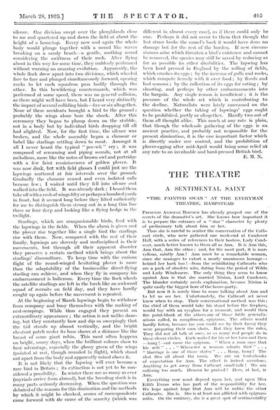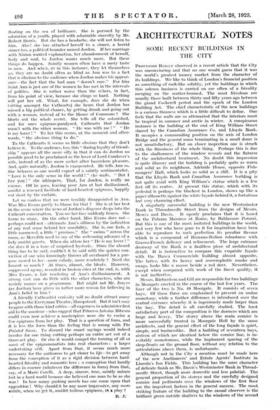THE THEATRE
A SENTIMENTAL SAINT
"THE PAINTED SWAN " AT THE EVERYMAN THEATRE. HAMPSTEAD PRINCESS AN•roINE Binnsco has already grasped one of the secrets. of the dramatist's art. She' knows how important it is to prepare the entrance of . a " star " character by plenty of preliminary talk about him or her.
Thus she is careful to scatter the conversation of the Cath- cart circle, who were gathered one week-end at Candover Hall, with a series of references to their hostess, Lady Land- over, much better known to them all as Ann. It is Ann this, Ann that, Ann the other ; and, for the most part, it is mar- vellous, saintly Ann I Ann must be a remarkable woman, since she manages to extort a nearly unanimous homage— behind her back too !—from the scintillating Cathcarts who . are a pack of obsolete wits, dating from the period of Wilde, and Lady Windemere. The only thing they seem to know against Ann is that she married Ninian, Lord Landover.. The blunder certainly needs explanation, because Ninian is quite easily the biggest bore of the house-party.
But now it is surely time to cease talking about Ann and to let us see her. Unfortunately, the Cathcart set never knew when to stop. Their conversational method was this: the chief of them. would take his stand before the fireplace, would toy with an eyeglass for a moment, and would then fire point-blank at the others one of those futile generaliz- ations called, in compliment, epigrams. The others would hardly listen, because (as you could see by their faces) they
were preparing their own shots. But they knew the rules. They did not all talk at once, as so many real people do in these clever circles. Each waited for his or her turn and then —bang !—out came the epigram. " When a man says that his wife " . . . " Whenever a woman admits that " . .
" Marriage is one of those states " . . . Bang, bang ! The shot flies all about the room. We arc on tenterhooks of expectation for Ann. The effect is indeed overdone. Anything to get away from Cathcart small-talk I We are suffering too much. Heaven be praised Here, at last, is Ann.
Everything now must depend upon her, and upon Miss Edith Evans who has part of the responsibility for her.
We hope against hope that Ann will be unlike the other. Cathcarts. She is. She is at least not afflicted with epigram- mitis. On the contrary, she is a great spot of sentimentality floating on the sea of brilliance. She is pursued by the adoration of a youth, played with admirable sincerity by Mr.
Robert Harris. But she has a headache, she will not listen to him. Alas! she has attached herself to a sinner, a horrid sinner too, a political bounder named Jordon." If her marriage with Ninian wanted explanation, her abandonment of herself, body and soul, to Jordon wants much more. But these things do happen. Saintly women often have a nasty taste in men. And when, as in this instance, they let themselves go, they are no doubt often as blind as Ann was to a fact that is obvious to the audience when Jordon makes his appear- ance—the fact that the bad man " doesn't care." For him Saint Ann is just one of the women he has met in the intervals of politics. She is rather worse than the others, in fact, from his point of Niels', because she clings so hard. Nothing will put her off. What, for example, does she do when (sitting amongst the Cathcarts) she hears that Jordon has missed a big political chance, by getting drunk and going out with a woman, instead of to the House of Commons ? She blurts out the whole secret. She tells all the astonished, and for once epigram-paralysed, Cathcarts that Jordan wasn't with the -Other woman. " He was with me ! " " He is my lover ! " To her this seems, at the moment and after- wards, " the obvious thing to do."
To the Cathearti it seems so little obvious that they don't believe it. To the audience, too, this " flaring loyalty of friend- ship " appears all the more silly in that it can do Jordon no possible good to be proclaimed as the lover of Lord Candover's wife, instead of as the mere seeker after hazardous pleasure. And, quite naturally, Jordon is exasperated. He tells Ann so. She behaves as one would expect of a saintly sentimentalist. " Love is the only sense in the world ! " she wails. " But I lore you! " she whimpers. That, for Jordon, is really no excuse. Off he goes, leaving poor Ann at last disillusioned, amidst a renewed fusillade of hard-hearted epigrams, happily cut-short by the curtain. • Let us confess that we were terribly disappointed in Ann. Was Miss Evans partly to blame for that ? She is at her best in the scene where the news of Joidon's diSgrace drops into the Cathcart conversation. You see her face suddenly frozen. She turns to stone. On the other hand, Miss Evans does not— perhaps could not—attenuate Ann's silliness by the indication of any real sense behind her sensibility. " She is, one feels, a little mannered; a little " precious." She " swims " across the room, as Meredith Used to say of the welcoming" advance of a lady amidst guests. When she utters her " He is my lover ! " she does it in a tone of surprised hysteria. Since the absurd thing has to be said, couldn't it be said with the quieter con- viction of one who knowingly throws all overboard for a pur- pose sacred to her—more calmly, more resolutely ? Need she lament so much ? At times, almost, she bleats. However, suppressed agony, revealed in broken cries at the" end, is, with Miss Evans, a fair rendering of Ann's disillusionment. A strong cast can do little with the other characters, who are mainly names on a programme. But might not Mr. Jeayes (as Jordon) have given us rather more reason for believing in Ann's belief in him ?
A friendly Cathcartist curiosity will no doubt attract many people to the Everyman Theatre, Hainpstead. But it isn't easy to agree with those kind critics—all eagerness to administer first aid to the amateur—who suggest that Princess Antoine Bibesco could even now achieve a masterpiece were she to excise a few epigrams from her play. That is a question of form, and it is less the form than the feeling that is wrong with The Painted Swan. To discard the smart sayings would indeed involve for one thing cutting perhaps an entire act out of a three-act play. Or else it would compel the turning of all or most of the epigrammatists into real characters : a larger undertaking still. Apart from that, it seems much more necessary for the authoress to get closer to life—to get away from the conception of it as a rigid division between hard. hearted frivolity and romantic love : a conception that hardly differs in essence (whatever the difference in form) from that, say, of a Marie Corelli. A deep, sincere, true, saintly nature lost in a hard world because she believed one man to be as she was ! In how many gushing novels has one come upon that opposition ! Why should it be any more impressive, any more subtle, when we get it, amidst tedious epigrams, in a play ?
• 11.•















































 Previous page
Previous page